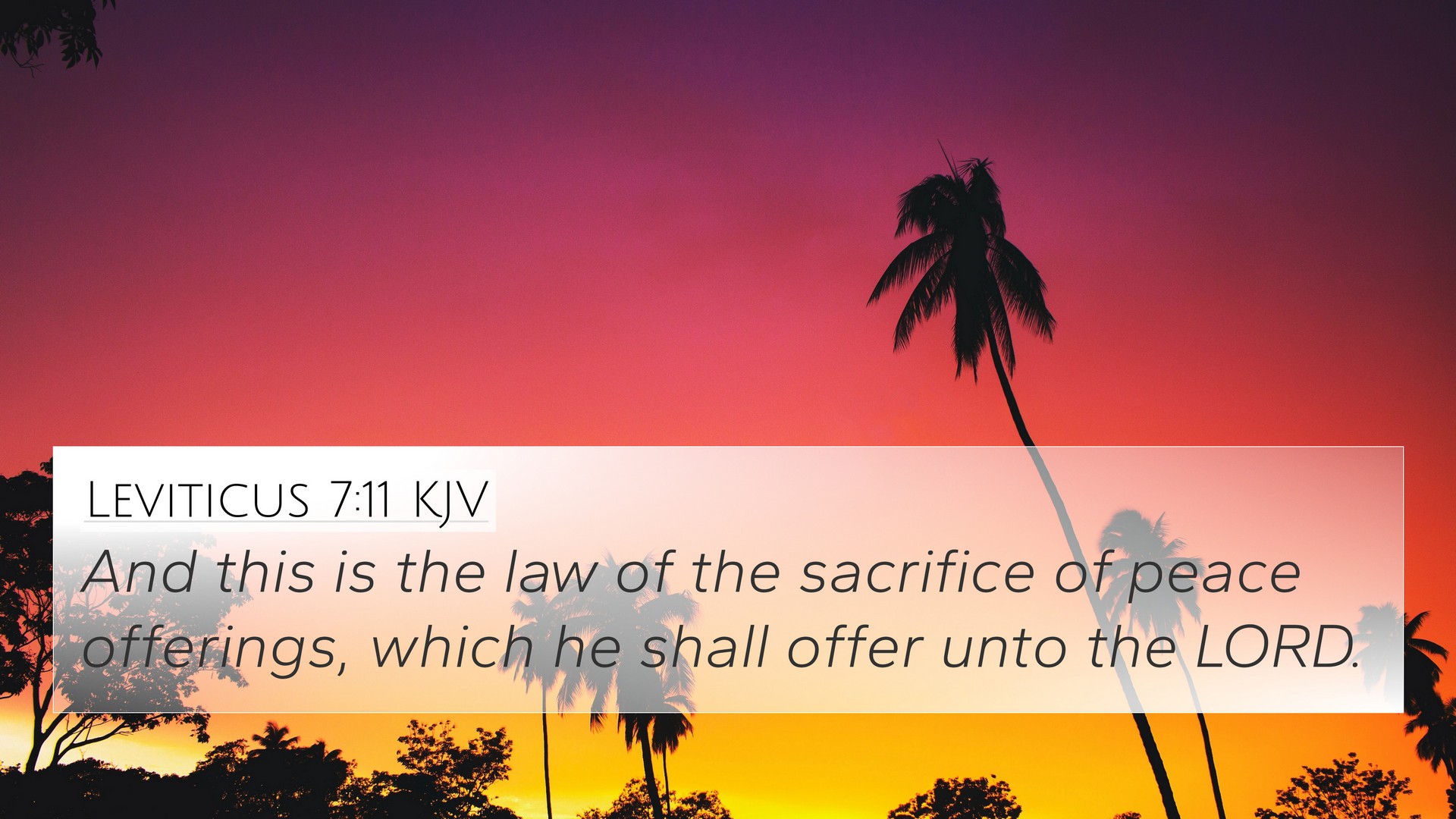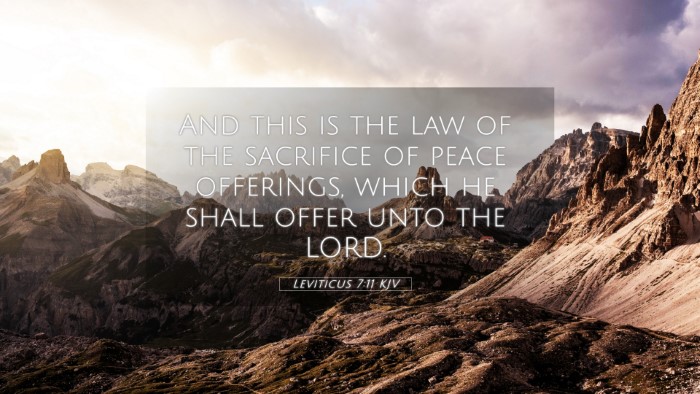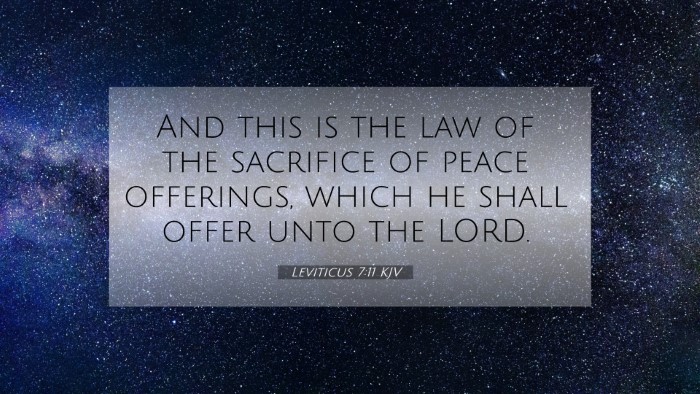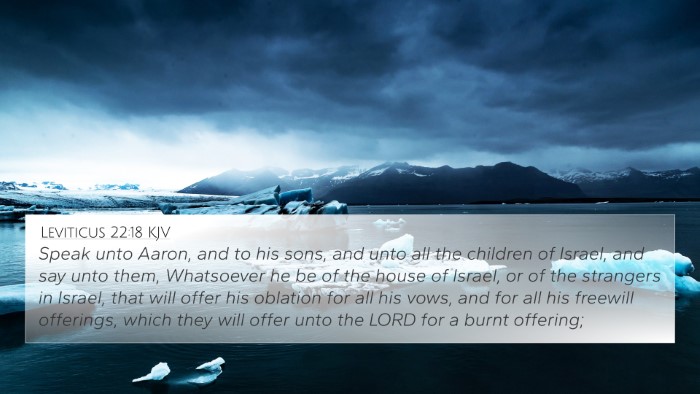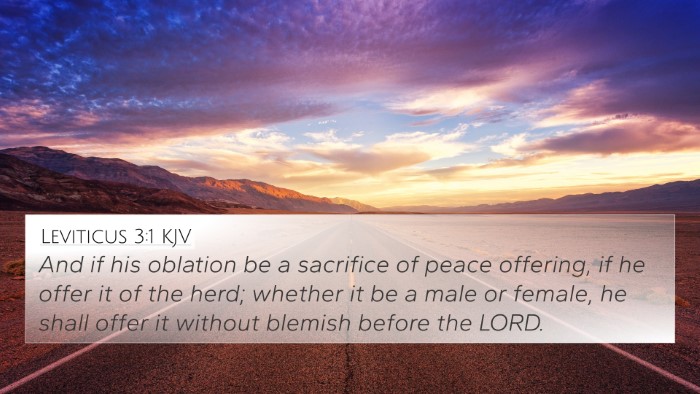Understanding Leviticus 7:11
Leviticus 7:11 states, "And this is the law of the sacrifice of peace offerings, which he shall offer unto the LORD." This verse is part of the instructions given to the Israelites regarding their offerings and serves as a foundational reference for the understanding of peace offerings in the Old Testament.
Summary of Leviticus 7:11
The emphasis on the peace offerings highlights the relationship between God and His people. These offerings were meant to symbolize communion and fellowship. They were not merely ritualistic but were intended to foster a deeper connection with God.
Commentary Insights
-
Matthew Henry explains that peace offerings represent a thankfulness for God’s blessings and serve to express joy in the relationship with God. He emphasizes that these offerings were a way to celebrate the benefits received and maintain goodwill with the divine.
-
Albert Barnes notes that the peace offering is significant because it was part of the covenant relationship, where the offerer and God partook together in the meal that followed the sacrifice. This act symbolizes peace, unity, and fellowship, which are central themes throughout the Bible.
-
Adam Clarke elaborates that these offerings were also meant to serve as a communal event, where family and friends could gather. He underlines the societal implications of such sacrifices, showcasing the importance of community in the practice of faith.
Bible Verse Cross-References
Leviticus 7:11 establishes several connections with other scriptures, enhancing our understanding of its meaning. Here are some key cross-references:
- Leviticus 3:1-5 - Describes the detailed process of the peace offering, highlighting its significance in maintaining a peaceful relationship with God.
- 1 Chronicles 16:1 - Illustrates the practice of bringing peace offerings to celebrate God's goodness and presence.
- Psalm 107:22 - Encourages sacrifices of thanksgiving, echoing the intent behind peace offerings as expressions of gratitude.
- Hebrews 13:15 - Relates to the concept of a spiritual sacrifice of praise, connecting New Testament practices back to the Old Testament essence of offerings.
- Matthew 5:24 - Jesus instructs that reconciliation with others is crucial before presenting offerings, lifting the spirit of peace offerings to higher moral obligations.
- Romans 12:1 - Suggests that believers are to offer themselves as living sacrifices, reflecting the underlying theme of peace and fellowship with God.
- Ephesians 2:14 - Indicates that Christ is our peace, further developing the theme of peace offerings and their ultimate fulfillment in Jesus.
Thematic Bible Verse Connections
Leviticus 7:11 not only stands on its own but acts as a bridge to various themes throughout the scripture:
-
Fellowship: The peace offering emphasizes communion with God, a theme mirrored in the New Testament through the Lord's Supper (1 Corinthians 11:24-26).
-
Gratitude: The practice of offering thanks is vital; as seen in Psalm 50:14, God desires gratitude as part of worship.
-
Community: Leviticus 7:11 and the emphasis on shared meals reflect the communal aspect of faith, paralleled in Acts 2:46-47.
How to Use Bible Cross-References
Understanding how to utilize Bible cross-references is essential for deeper study:
- Utilize Bible concordance tools to find related verses.
- Engage in Bible cross-reference guides provided by study resources to broaden comprehension.
- Implement cross-reference Bible study methods to connect themes across various scriptures.
Conclusion
In summary, Leviticus 7:11 serves a vital role in establishing the framework for peace offerings in the Old Testament while connecting many thematic elements and foreshadowing the fulfillment of these practices in the New Testament through Jesus. Therefore, studying the interconnections of various Bible verses enhances one’s understanding of scriptural teachings and fosters a richer faith experience.
